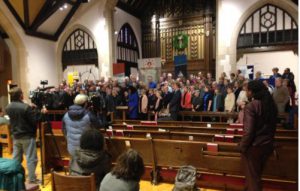TOLERANCE AND SOLIDARITY .
An article by Frederick Melo from the Twin Cities Pioneer Press
The rhetoric on immigration during the presidential campaign season has struck fear into the hearts of many foreign-born families, and a new network of Minnesota churches is mobilizing to respond.
The Lutheran Church of the Redeemer on St. Paul’s Dale Street already maintains 22 shelter beds for the homeless in its basement, where families with no other place to go often spend the night on a temporary basis. The Rev. James Erlandson said those beds may soon serve a different purpose: offering sanctuary to those facing deportation.

“That’s a moral stand that we’ve taken,” Erlandson said. “We want to say: ‘Don’t increase deportations.’ Let’s fix our immigration system, and offer a path to citizenship so our neighbors don’t live in fear.”
On Tuesday, clergy and religious leaders from 30 congregations gathered at the Church of the Redeemer to announce that 13 churches across Minnesota have agreed to open their doors to immigrants, whatever their circumstances, even those sought by law enforcement.
For the 13 “sanctuary churches” like the Church of the Redeemer, that means being prepared to house those who might face deportation, and shuttling them from church to church as the need arises.
In practical terms, how long any given church would be able to house a family remains unclear, but church officials on Tuesday referenced the Underground Railroad that helped hide and guide southern slaves to freedom.
“That’s unknown,” said the Rev. Mark Vinge of the House of Hope Lutheran Church in New Hope, “but we know that the Lord will guide us.”
Rather than house those living in the U.S. illegally outright, some “sanctuary support” congregations have agreed to assist the faith-based network with donations of food, money, clothing and toiletries, or prayer vigils, news conferences and legal assistance. Meanwhile, 20 churches are still discussing details with their congregations or church councils and contemplating whether to join the new Sanctuary or Sanctuary Support networks, and in what capacity.
(Article continued in the right column)
The post-election fightback for human rights, is it gathering force in the USA?
(Article continued from the left column)
The churches are all affiliated with ISAIAH, a faith-based coalition of racial and social justice advocates based on University Avenue in St. Paul.
“We’re also seeking legal counsel to understand (our rights),” said the Rev. Grant Stevenson, an ISAIAH staff member. “What we know for sure is that standing on our faith we cannot allow families to be torn apart because someone ran for president on a platform of hate.”
The pastors acknowledged that the details of President-elect Donald Trump’s immigration plans remain unknown, but they said his tough rhetoric has created an atmosphere of unease, though one that has been building for years.
Returns (including voluntary departures and sending border-crossers back across the U.S.-Mexican border on buses) exceeded 8 million under President George W. Bush, and removals (formal, documented deportations) hit a historic high of more than 2 million under President Barack Obama.
“If there is an event of mass deportation, we’ll be ready,” said ISAIAH spokeswoman Janae Bates.
An ISAIAH guide sheet notes that “guidelines are at the discretion of individual churches and their congregants,” but the goal is have individuals or families “reside in your place of worship for an undetermined amount of time while the community of Sanctuary works on the ‘Stay of Removal’ orders for each person.”
Vinge said his 13-member church council met a week ago to discuss whether to name House of Hope a sanctuary church. His house of worship is active in helping the homeless and worked with Southeast Asian refugees in the 1970s, following the Vietnam War. Still, he said the prospect of housing a family “24 hours a day, 7 days a week” gave some members pause.
“Others wondered if maybe we should just be a ‘supporting congregation,’ helping others do this,” Vinge said. “But in the end we want to be part of this.”
During a joint presentation to reporters Tuesday, Vinge took the microphone to quote from the Bible, Leviticus 19:33-34: “When a foreigner resides among you in your land, do not mistreat them. The foreigner residing among you must be treated as your native-born. Love them as yourself, for you were foreigners in Egypt. I am the Lord your God.”